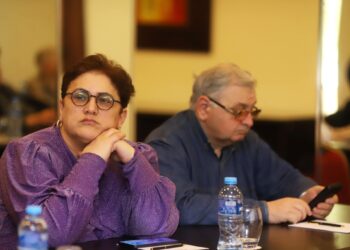The improvement of Georgia’s security system and the search for new approaches and solutions is a continuous process. And this is not surprising, as our region and the world have been in constant transformation since our regained independence, with regional and global centers of power realigning from time to time, new centers forming, military or political alliances expanding, shrinking or modifying. Additional risks and challenges arise as a result of profound geopolitical, economic and social processes. This, in turn, requires continuous improvement of the national security system and adequate adaptation to changing risks.
As modest as Georgia’s role in modern global processes is, the impact of these processes on the present of our country and its development is great. Explaining this relationship will not be difficult if we recall the restructuring of international relations from the seemingly already known foundations to new, as yet unformed, extremely difficult, risky (in some places murky) and untested beginnings. The list of issues to be discussed from this point of view is extensive, but this time we will focus specifically on only a few – not for general extrapolation, but in order to show their natural connection with our country.
We believe that here it is necessary for us to take into account the role and weight of the great powers in the new system of international relations, as well as their relations in the global and regional context. This special attention to the “constellation of first-order countries” has a simple justification: regardless of the various teachings, schools, conceptions, or practical doctrines of international relations, the nature and content of these relations have been based on one simple and brutal factor, and so it will be for the foreseeable future. This factor is the power of the “High and Mighties,” global and supra-regional states, in the world’s geopolitical and geo-economic arena, and their influence on processes and outcomes.
Though theorists and practitioners sometimes “colored” the various stages of the twentieth century, as well as this century, with charming doctrinal names, even then, the laws of realism, nurtured by the ghost of the Hobbes’s world, were behind them. Let us not simplify the conversation on this topic by saying that force is always the determining factor. Of course, this is not always the case, but it is still mostly so. And we must be ready for this – both for an ideology that corresponds to Georgian realism and for the correct and adequate adaptation of national resources to this ideology.
In evaluating the processes taking place around our country, we will rely on a couple of voluntary limitations, or “locks”. With their help, we will keep the necessary moderation in our reasoning, as well as in the conclusions attached to realism: what Georgian political thinking, culture of speech, and the way of doing things are so much in need of today. By such limitations, we will avoid that scandalous or sensational mixture of tones, characteristic in many respects of Georgian political and public figures, which so often spills over from Georgian television into our business or personal space.
One such limitation is the conscious rejection of the “we know it all” attitude. In this way, we will get rid of a harmful result, the effect of which is destructive, separating us from a well-wisher, supporter, ally, resulting in them losing the desire to help us with advice and action; as a result of the self-isolation caused by such “glorification” of the self, in fact, we will gradually face the danger of becoming a “pariah state”.
The situation when we do not believe in ourselves, seeing us lose faith in our capabilities, suppressing the national potential developed over centuries, voluntarily withdrawing from the affairs of the country and thus refusing to create a national and state destiny, has virtually the same effect of pushing us into isolation. In being self-bound and depressed, we gradually become incapacitated; by laxity and indifference, we destroy the motivation of the country’s well-wishers, supporters and allies to cooperate with us, and induce them to lose their desire for relations. As a result, the country is presented to the world as an uninteresting and useless “actor”.
In short, both extremes portend the same future: the country becomes nonfunctional – in one case due to excessive (and unjustified) ego, and in the other scenario due to the lack of national identity and elementary ambition necessary for a state. It does not matter much for Georgian society in which case the national and state perspective of the country, the guide of its modernization and competitiveness, the possibility of realization of the civilizational choice will be nullified.
A few relevant reminders
Speaking about conflicts of the modern type, it is necessary to take into account that:
• Absolute security is virtually unattainable, and promises of it are futile;
• In recent decades, the persuasiveness of international legal norms has declined sharply;
• The weight of international law and, with it, of international organizations, has declined significantly;
• The effectiveness of preventive political and legal mechanisms has clearly come to depend on the goodwill and determination of the “High and Mighties”;
• The nuclear component in the balance of international relations has lost its original deterrent and counterbalancing effect;
• A common approach to achieving geopolitical advantage has become the so-called “Salami Aggression” (or ‘gradual aggression’) – building and formalizing a political outcome on a gradually achieved military advantage;
• The structure and nature of military conflict has changed, and the methods used are so complex that separating its passive and active phases has become pointless.
Of the above aspects, I would like to consider the last one, as it is directly related to the campaign against Georgia’s security from the 1990s to the present day. It is particularly noteworthy here that anti-Georgian and anti-state actions have not always taken the form of open aggression. At the same time, it should be noted that the encroachment on the sovereignty and territorial integrity of our country is almost continuously carried out by means of the so-called “gray zone operations”, i.e. such measures that qualify it as a so-called “low-intensity conflict”.
In other words, although the actions of the aggressor do not formally bear the signs of a declaration of war, by their forceful nature they are aimed at reducing the defense capability of the target country, undermining its security and state foundations and limiting the operational space and resources for the fulfillment of national tasks. Thus, in this case, it is not a classic casus belli, but rather that the aggressor places the victim under its influence in a form (which includes, inter alia, neutralizing appropriate international support or imposing substantial restrictions on such support) that does not require the engagement of armed forces for the purpose of overt aggression. To put it another way, the purpose of “gray operations” in a “low-intensity” format is to disrupt the state resilience of the target country and deplete its resources. The Center for Strategic and International Security interprets this phenomenon in a much more complex way, noting that such operations are “between routine management and open warfare” and that the initiator of “gray operations” tries to exploit certain advantages in a way that does not “cross the line into open warfare.”
To further simplify the issue, this is how an aggressor employs a strategy that seeks to obtain a desired economic, military, diplomatic, and political outcome while avoiding a direct and costly response from the other side. Appropriate influence and pressure may imply limiting the target country’s access to a promising market of the aggressor (remember the closure of the Russian market for Georgian products at one time). Also, the aggressor country may take care to maximize diplomatic isolation of the target country from third countries (China’s attitude towards Taiwan).
In short, despite the variety of definitions of “gray” and “low-intensity” operations, their conduct is ultimately aimed at the gradual “exhaustion” of the target country, so that the latter is forced to agree to the terms desired by the aggressor or to pursue a course acceptable to it.
Importantly, an aggressor country may forgo the use of military units and rely wholly or partially on law enforcement or other paramilitary structures to conduct “gray” or “low-intensity” operations. Moreover, certain civilian resources can be used for this purpose. All of this makes it possible to “go along the edge” in conducting a violent campaign, which in turn reduces the possibilities for proper legal qualification and countermeasures under international law.
What are we to counter with? What should we care about?
Speaking about the response measures of the Georgian side, we picture three categories of the so-called defensive barrier: one at the national level, the second in coordination with our international partners, and, the third, implementation of measures aimed at increasing the geo-economic function and usefulness of the country.
Measures needed at the national level
“Low-intensity” operations usually aim to encroach on the Georgian air, maritime and economic space, and will continue to do so in the future.
With regard to air and water, the implementation of modern surveillance systems remains a priority issue. Here, we are mainly referring to cheap drones and relevant sensors, which are needed for timely detection of intrusion into Georgian air and sea space and development of the necessary response. Of particular importance is the improvement of the Georgian military and industrial complex and the fulfillment of at least basic requirements for effective surveillance. It is also necessary to further improve the capabilities of the Georgian Coast Guard and bring it closer to modern standards.
With regard to the economic ecosystem as the cornerstone of any effective security system, we will reiterate the few suggestions and recommendations that we consider necessary, namely:
In the context of growing economic nationalism in the world, not only is the quantity of investments important, but also their quality. Thus, given the current threats, we believe that it is unacceptable to consider just any investment as desirable for our country: the time has come to learn how to distinguish and select them. For this purpose, we believe it is advisable to check investments, to introduce a mechanism of their so-called “screening” by law. We should also note that many developed economic systems use this method today.
In addition to the above, a large and separate place should be given to the issue of economic security in the national security doctrine of Georgia. This special attention, again, is dictated by the modern and multifaceted understanding of the concept of “security” mentioned in this article. Let us agree that national security is unthinkable without a unified set of economic measures, because no one will consider and talk to a weak, poor country with constant requests for help in this world as worthy partners.
It has to be particularly noted that the economic security dimension should be strengthened in the format of the National Security Council. As one of the possible developments, we do not rule out the separate creation of an Economic Security Council or its institutionalization within the framework of the National Security Council.
Moreover, speaking about the structural approach, we also consider as a possible subject of discussion the introduction of the position of the Minister of Economic Security in the Government of Georgia with the corresponding supervisory scope and functions.
In any case, whether under the auspices of the Economic Security Council or the Minister of Economic Security, one of the fundamental tasks should be the continuous monitoring and analysis of risks and threats to Georgia’s economic security, and this process should be objectively reflected in a periodic document on economic threats (similar to the current practice in the European Union), which, along with other necessary issues, will assess short-, medium- and long-term risks to the country’s economic security, as well as recommended measures to minimize and manage them.
Along with the doctrinal approach, the feasibility of legislation ensuring economic security (e.g., Georgia’s “Law on Economic Security”) should equally be discussed. When working on such legislation, inter alia, special attention should be paid to:
(a) Coordination of the activities of public authorities in times of crisis;
(b) Rapid change from one global or regional delivery and supply chain to another, and reducing overdependence on any one system;
(c) Promoting modern innovation in critical sectors. We realize that there is a lot to talk about in this regard and many more key aspects could be mentioned. However, it is also a fact that all of them can be realized only in conditions of normalization of relations within the country.
Today, in the era of the fight against disinformation, the Georgian side should constantly take care of the “hygiene” of the information field, protecting the public consciousness and mind from harmful influences and manipulations. From this perspective, it is critical to ensure the integrity of communications systems, train qualified cybersecurity professionals, and properly protect the Internet and other communications networks.
Continuous coordination and sustained cooperation with our international partners, including utilizing their existing infrastructure and expertise, are critical to strengthening information security. As part of this cooperation, it is desirable to establish joint working groups and plan a unified response to unforeseen events.
From this point of view, the efforts of the Georgian side should be even more focused on the Black Sea factor, which from a security point of view is both a great challenge and a great opportunity.
Analysis by Victor Kipiani, Geocase Chairman














